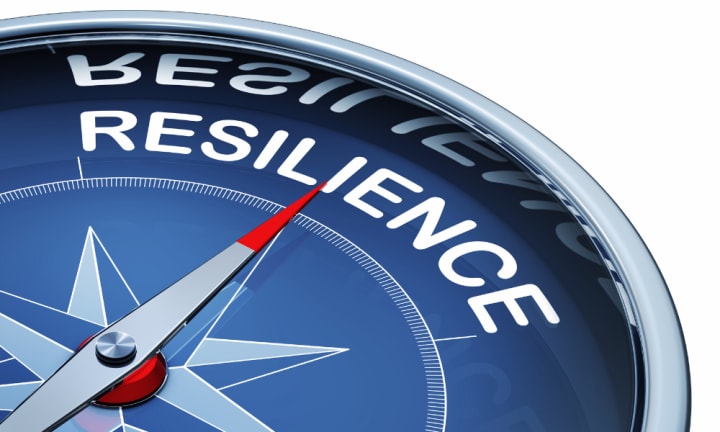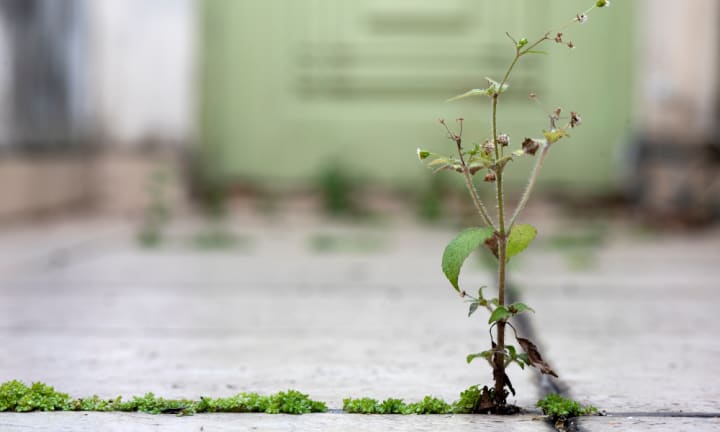The Power of Potent: How to Harness the Strength of Your Inner Resilience
Building and Maintaining Resilience for Overcoming Life's Challenges

introduction

Resilience is the ability to bounce back from adversity, to overcome challenges, and to adapt to change. It is a crucial skill to have in today's fast-paced and ever-changing world. Life can be unpredictable, and we all face setbacks and challenges at some point in our lives. However, some people seem to have an inner strength that allows them to navigate these challenges with ease, while others struggle to cope. The good news is that resilience is not a fixed trait; it can be cultivated and strengthened over time. In this article, we will explore the power of inner resilience and how to harness its strength to overcome obstacles, build a strong support system, and thrive in the face of adversity. We will discuss practical strategies for building and maintaining inner resilience, as well as how to overcome obstacles that may hinder our ability to bounce back. By the end of this article, you will have a deeper understanding of the importance of cultivating inner resilience, and a roadmap for harnessing its power to navigate life's challenges with grace and strength.
Understanding Inner Resilience

Inner resilience is the ability to bounce back from adversity, to adapt to change, and to maintain a sense of strength and purpose in the face of challenges. It is a key component of mental and emotional well-being, and is an essential skill to have in today's world. Inner resilience is not just about being tough or pushing through difficult times; it is about having a deep understanding of yourself, your values, and your strengths, and using these to navigate challenges with grace and strength.
One of the key characteristics of inner resilience is the ability to stay present and focused in the moment, even in the midst of chaos or uncertainty. This means being able to acknowledge and accept difficult emotions, without getting overwhelmed by them. It also means being able to cultivate a positive mindset and self-talk, even in the face of setbacks or challenges.
Another important characteristic of inner resilience is the ability to practice self-care. This means taking care of your physical, emotional, and spiritual needs, and making time for activities that nourish your soul. It also means having a strong support system of friends, family, and mentors who can provide encouragement, guidance, and a listening ear when needed.
Finally, inner resilience is about having strong problem-solving skills, and being able to approach challenges with a growth mindset. This means seeing setbacks as opportunities for learning and growth, and being willing to take risks and try new things in order to achieve your goals.
Overall, cultivating inner resilience requires a deep understanding of oneself, and a willingness to practice self-care, stay present in the moment, and approach challenges with a growth mindset. By harnessing the power of inner resilience, we can navigate life's challenges with strength and grace, and live a more fulfilling and meaningful life.
Building Inner Resilience

Building inner resilience is an ongoing process that requires commitment, self-awareness, and practice. Here are some strategies for cultivating inner resilience:
Acknowledge and accept emotions: One of the first steps in building inner resilience is to acknowledge and accept difficult emotions, such as fear, anxiety, or sadness. It is important to recognize that these emotions are a normal part of the human experience, and that it is okay to feel them.
Cultivate positive self-talk and mindset: Developing a positive mindset and self-talk can help you stay focused, motivated, and resilient in the face of challenges. This means learning to reframe negative thoughts into positive ones, and focusing on your strengths and accomplishments rather than your weaknesses and failures.
Practice self-care: Taking care of your physical, emotional, and spiritual needs is essential for building inner resilience. This means getting enough sleep, eating well, exercising regularly, and making time for activities that bring you joy and fulfillment.
Develop problem-solving skills: Having strong problem-solving skills can help you approach challenges with a growth mindset, and see setbacks as opportunities for learning and growth. This means being willing to take risks, try new things, and learn from your mistakes.
Build a support system: Having a strong support system of friends, family, and mentors can provide encouragement, guidance, and a listening ear when needed. It is important to surround yourself with people who believe in you, and who will support you through both the good times and the bad.
Learn from failures and setbacks: Rather than getting discouraged by failures and setbacks, it is important to see them as opportunities for growth and learning. This means taking the time to reflect on what went wrong, and using this information to make improvements and move forward.
By practicing these strategies, you can build inner resilience and develop the skills and mindset necessary to navigate life's challenges with strength and grace. Remember that building inner resilience is an ongoing process, and that it takes time and commitment to cultivate this important skill.
Overcoming Obstacles

Overcoming obstacles is an essential part of building inner resilience. While we cannot control the challenges that life throws our way, we can control how we respond to them. Here are some strategies for overcoming obstacles and building inner resilience:
Stay present and focused: When faced with a challenge, it is important to stay present and focused in the moment. This means avoiding the temptation to dwell on the past or worry about the future, and instead focusing on the present moment and what you can do to move forward.
Reframe negative thoughts: Negative thoughts and self-talk can be a major obstacle to building inner resilience. It is important to learn how to reframe negative thoughts into positive ones, and to focus on your strengths and accomplishments rather than your weaknesses and failures.
Seek support: Having a strong support system of friends, family, and mentors can be a valuable resource when facing challenges. Don't be afraid to reach out to others for help and support when needed.
Practice self-care: Taking care of your physical, emotional, and spiritual needs is essential for building inner resilience. This means getting enough sleep, eating well, exercising regularly, and making time for activities that bring you joy and fulfillment.
Stay flexible and adaptable: One of the key characteristics of inner resilience is the ability to adapt to change and navigate uncertainty. This means being willing to adjust your plans and strategies as needed, and to stay open to new possibilities and opportunities.
Learn from setbacks and failures: Rather than getting discouraged by setbacks and failures, it is important to see them as opportunities for growth and learning. Take the time to reflect on what went wrong, and use this information to make improvements and move forward.
Remember that building inner resilience is an ongoing process, and that setbacks and obstacles are a normal part of life. By staying present and focused, reframing negative thoughts, seeking support, practicing self-care, staying flexible and adaptable, and learning from setbacks and failures, you can overcome obstacles and build the inner resilience needed to navigate life's challenges with strength and grace.
Maintaining Inner Resilience

Maintaining inner resilience requires ongoing commitment and practice. Here are some strategies for maintaining inner resilience:
Cultivate gratitude: Focusing on what you are grateful for can help shift your mindset towards positivity and resilience. Make a habit of expressing gratitude regularly, whether through journaling, meditation, or simply taking a moment to appreciate the good things in your life.
Practice mindfulness: Mindfulness practices, such as meditation or deep breathing, can help you stay centered and calm in the face of stress and challenges. Make a habit of incorporating mindfulness into your daily routine, whether through formal meditation or simply taking a few deep breaths whenever you feel stressed or overwhelmed.
Stay connected: Maintaining strong connections with others is essential for building and maintaining inner resilience. Make an effort to stay connected with friends, family, and mentors, even if it is just through phone or video calls.
Set realistic goals: Setting realistic goals and working towards them can help you stay motivated and focused, and can provide a sense of purpose and direction. Make sure to set goals that are achievable and meaningful to you.
Take care of your physical health: Taking care of your physical health is essential for maintaining inner resilience. This means getting enough sleep, eating a healthy diet, and exercising regularly.
Practice self-compassion: Treat yourself with kindness and compassion, even when you make mistakes or face setbacks. Remember that building inner resilience is a journey, and that it is okay to make mistakes and experience setbacks along the way.
By practicing these strategies, you can maintain inner resilience and continue to build the skills and mindset necessary to navigate life's challenges with strength and grace. Remember that maintaining inner resilience is an ongoing process, and that it requires ongoing commitment and practice.
Conclusion

In conclusion, building and maintaining inner resilience is essential for navigating life's challenges with strength and grace. By understanding the nature of inner resilience, building resilience through mindfulness, setting realistic goals, seeking support, and practicing self-care, we can overcome obstacles and setbacks and emerge stronger and more resilient on the other side.
It's important to remember that building inner resilience is an ongoing process, and that setbacks and obstacles are a normal part of life. But by staying present and focused, reframing negative thoughts, seeking support, practicing self-care, staying flexible and adaptable, and learning from setbacks and failures, we can continue to build and maintain our inner resilience, even in the face of adversity.
So whether you're facing a difficult challenge or simply looking to build your inner resilience for the future, remember that the power of your inner resilience is within you. By harnessing this strength and cultivating the skills and mindset necessary to maintain it, you can navigate life's challenges with grace and resilience, and emerge stronger and more capable on the other side.






Comments
Yahya Bukhari is not accepting comments at the moment
Want to show your support? Send them a one-off tip.